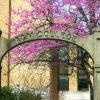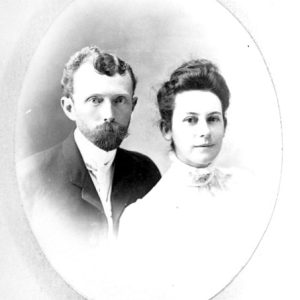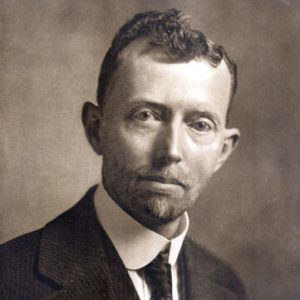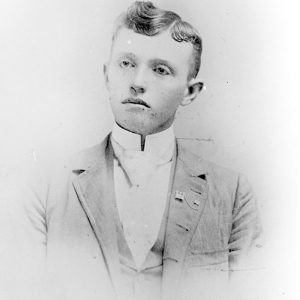calsfoundation@cals.org
David Yancey Thomas (1872–1943)
David Yancey Thomas was one of the most influential academic historians in the field of Arkansas history. He was a driving force in the re-establishment of the Arkansas Historical Association (AHA) in 1941, was the first editor of the Arkansas Historical Quarterly, was the chair of the Department of History at the University of Arkansas (UA) in Fayetteville (Washington County) for twenty-eight years, and was known nationally for his scholarly books and articles.
David Thomas was born on January 19, 1872, to James Fuller Thomas and Eliza Ann Ratliff Thomas. He grew up on a farm in southwest Kentucky, near Hickman in Fulton County. He was the youngest of nine children.
Thomas was a student at Marvin Training School in Clinton, Kentucky, from 1888 to 1890. He earned an AB in Greek and Latin at Emory College in Oxford, Georgia, in 1894 and an AM in Greek and Latin from Vanderbilt University in 1898. He studied at the University of Chicago from 1899 to 1900 and was awarded a PhD in history and political science from Columbia University in 1903. He taught Latin and Greek at Hendrix College in Conway (Faulkner County) from 1898 to 1901 and was professor of history and political science at Hendrix (1902–1905). Thomas was a university fellow in history at Columbia (1901–1902), taught history and political science courses at the University of Florida (1905–1907), was associate professor of history and political science at the University of Arkansas (1907–12), and professor and head of the history and political science department at the University of Arkansas (1912–1940). He was a member of the summer faculty at Peabody College for Teachers in Nashville, Tennessee, in 1917, and the University of Texas in Austin in 1924, 1930, and 1940.
D. Y. Thomas and Sarah Janney of Conway married on June 21, 1905. They had two children: Mary Elizabeth, born in 1907, and Albert Janney, born in 1909.
Thomas was the author or co-author of seven books. Five of the books focused on Arkansas: History of the University of Arkansas (with John Hugh Reynolds, 1910), Direct Legislation in Arkansas (1914), Arkansas in War and Reconstruction, 1861-1874 (1926), Arkansas and Its People, a History, 1541–1930 (1930), and The Story of Arkansas (with Hazel Presson, 1942). Other books included A History of Military Government in Newly Acquired Territory of the United States (1904) and One Hundred Years of the Monroe Doctrine, 1823–1923 (1923).
Thomas frequently remarked on the difficulty he had in finding materials to support his Arkansas research, and he became a tireless advocate for the preservation of Arkansas archival materials. He wrote scores of letters to prominent Arkansans, asking for information and pleading with them to deposit their papers in the University of Arkansas library. In the 1930s, he convinced former governor George Donaghey of the need to preserve such papers, and Donaghey set up a special fund that allowed Thomas to buy old newspapers and documents for the university library.
Thomas was a social critic who spoke out frequently and forcefully on issues of his day. In one speech, he said that educators had an obligation to society to point out problems in the world and to work toward their solution. Before and after World War I, he represented Arkansas on the University Committee on Southern Race Questions, a regional coalition organized to call attention to racial problems in the South. On behalf of the committee, he condemned lynching in Arkansas and investigated the 1919 Elaine Massacre. During World War I, Thomas prepared special classes on war aims and European history for soldiers taking officers’ training at the university. In 1920, he developed a civics course for women who were preparing to vote for the first time. Between the world wars, Thomas was active in the peace movement and argued in favor of public ownership of utilities.
In 1940 the University of Arkansas Board of Trustees decided to enforce a rule that required faculty to retire at age sixty-five. Thomas was sixty-seven years old at the time. He was not financially prepared for retirement, so he took a job teaching international relations at the University of Texas. He remained there from 1941 until his death.
In 1940, when Thomas was between jobs, he turned to a project that he had been considering for years: the re-establishment of a statewide organization to support the publication of an Arkansas history journal. After months of preparation by Thomas and others, the AHA was organized in February 1941. Even though he had moved to Austin, Texas, Thomas agreed to edit the AHA’s quarterly journal.
Finding the material and the money to publish the first issues of the Arkansas Historical Quarterly was a great challenge. Thomas had to beg people for articles, and he did a lot of the writing and re-writing himself. Revenue from memberships was the sole source of money for publication of the Quarterly, and there was a constant worry as to whether the association could afford the next issue. Thomas managed to get out the first four issues in 1942 and had started on the fifth issue of the Quarterly before he died.
Thomas died on April 18, 1943, in Austin, Texas, and is buried in Oak Grove Cemetery in Conway.
For additional information:
“David Yancey Thomas, 1872–1943.” Arkansas Historical Quarterly 2 (Spring 1943): 97–104.
“David Yancey Thomas: Historian.” Arkansas Historical Quarterly 7 (Autumn 1948): 221–226.
David Yancey Thomas Papers. Shiloh Museum of Ozark History, Springdale, Arkansas.
David Yancey Thomas Papers. Special Collections. University of Arkansas Libraries, Fayetteville, Arkansas.
Rothrock, Thomas. “Dr. David Yancey Thomas.” Arkansas Historical Quarterly 27 (Autumn 1968): 246–257.
Bob Besom
Shiloh Museum of Ozark History
This entry, originally published in Arkansas Biography: A Collection of Notable Lives, appears in the CALS Encyclopedia of Arkansas in an altered form. Arkansas Biography is available from the University of Arkansas Press.
 Early Twentieth Century, 1901 through 1940
Early Twentieth Century, 1901 through 1940 Education, Higher
Education, Higher Literature and Authors
Literature and Authors David Thomas and Wife
David Thomas and Wife  David Thomas
David Thomas  David Yancey Thomas
David Yancey Thomas 




Comments
No comments on this entry yet.